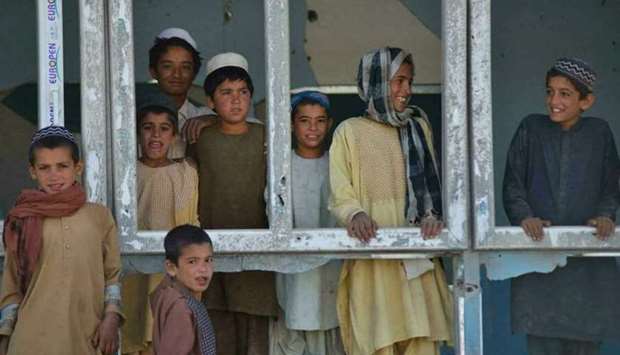Afghanistan will kick off its first countrywide polio immunisation campaign in years next month to protect millions of unvaccinated children, the UN said Monday.
The United Nations' health and children's agencies said the campaign to vaccinate against the crippling and potentially fatal disease would begin on November 8, with full support from the Taliban leadership.
"WHO and UNICEF welcome the decision by the Taliban leadership supporting the resumption of house-to-house polio vaccination across Afghanistan," they said in a statement.
Since the Taliban swept back into power two months ago, the UN had been talking with the group's leadership to address the towering health challenges in the country, the statement said.
"The Taliban leadership has expressed their commitment for the inclusion of female frontline workers," it said.
Afghanistan's new rulers had also committed to "providing security and assuring the safety of all health workers across the country, which is an essential prerequisite for the implementation of polio vaccination campaigns," the agencies said.
That marks a dramatic about-face from the Islamists' position during their years of insurgency against the ousted Western-backed government.
Due in large part to Taliban opposition to door-to-door vaccination campaigns, which they suspected were being used to spy on their activities, no campaigns with countrywide reach have been carried out in over three years.
Taliban leaders often told communities in areas they controlled that vaccines were a Western conspiracy aimed at sterilising Muslim children.
- 'Opportunity to eradicate polio' -
The UN agencies said next month's campaign would aim to reach 9.9 million children under five — more than a third of them in regions that had long been inaccessible to vaccinators.
A second nationwide polio vaccination campaign had also been agreed upon and would be synchronised with a campaign planned in neighbouring Pakistan in December, they said.
"This is an extremely important step in the right direction," WHO Representative in Afghanistan Dapeng Luo said in the statement.
"Sustained access to all children is essential to end polio for good."
In rare cases, polio infections surface in other countries caused by one type of polio vaccine that is no longer used — OPV — which contains small amounts of weakened but live poliovirus.
The UN agencies noted that only one case of wild poliovirus had been reported in Afghanistan since the start of the year, providing "an extraordinary opportunity to eradicate polio."
"Restarting polio vaccination now is crucial for preventing any significant resurgence of polio within the country and mitigating the risk of cross-border and international transmission," they said.
Herve Ludovic De Lys, UNICEF's representative in Afghanistan, stressed that "to eliminate polio completely, every child in every household across Afghanistan must be vaccinated."
"With our partners, this is what we are setting out to do."
The UN agencies said that children under five would also be provided with an extra dose of Vitamine A during the campaign.
The discussions with the Taliban leadership had also resulted in agreement on the need to "immediately start measles and Covid-19 vaccination campaigns", they said.

